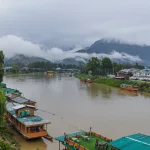For over three decades, Kashmir has been a land caught in a tragic paradox—of ethereal beauty and relentless bloodshed, of yearning for peace and recurring cycles of violence. Every incident of brutality that pierced the valley left deep scars, not only on its landscape but also on the hearts of its people. Yet, history is not immutable. Even in a place battered by grief, winds of change can rise, whispering promises of hope. Today, Kashmir stands at the threshold of such a change—subtle yet powerful, fragile yet profound.
In the aftermath of the most recent massacre —an event that, like many before it, sought to drag Kashmir back into the abyss of fear—something remarkable unfolded. This time, a large section of Kashmiri Muslims, the very people who had borne the maximum brunt of violence over decades, stood up with rare clarity and conviction. They raised their voices not in whispers but in a thunderous, public condemnation of the barbarity. They chose humanity over hatred, peace over provocation. Their response was not muted by fear, nor clouded by confusion. It was a clear, collective stand against all forms of violence that have for long kept Kashmir bleeding and broken.
This collective moral uprising is not just another reaction. It is, in truth, a historic moment—a definitive break from a past where silence, compulsion, and fear often reigned. For the first time in three decades, a significant and visible portion of the Kashmiri populace has openly and courageously raised its voice against Pakistan’s role in fomenting unrest and sponsoring bloodshed. This public denunciation of Pakistan’s interference is unusual, almost unprecedented. In a region where geopolitical narratives were carefully crafted and where dissent against external manipulation was often suppressed or silenced, this new open resistance marks a tectonic shift in the consciousness of the people.
Kashmiris, especially the younger generation, are refusing to be pawns in the cynical games played by external forces. They are demanding the right to live with dignity, to dream without fear, and to shape their own future without being held hostage by foreign designs.
The boldness with which Kashmiris have now openly criticized Pakistan is nothing short of extraordinary. For decades, Pakistan’s strategy rested on creating the illusion of widespread Kashmiri support for its designs. It manipulated genuine grievances, exploited moments of anger, and used fear to suppress dissent against its own interference.
Speaking out against Pakistan was often seen as dangerous, even fatal. Yet today, from villages to towns, from students to intellectuals, voices are rising—denouncing Pakistan’s duplicity, rejecting its attempts to hijack Kashmiri identity, and asserting their own right to peace and progress. This marks a psychological liberation more profound than any military victory. It shows that the people of Kashmir are reclaiming their agency, refusing to be tools in anyone else’s game.
This new narrative is not being imposed—it is rising organically from the soil of Kashmir, nourished by years of silent suffering and a deep desire for peace. It is a moral, emotional, and political turning point that must not be seen as a fleeting response but as the foundation of a new Kashmir—one where the spirit of peace can take root and flourish.
It is vital that we, as a nation, recognize and respect this transformation. The voices that dared to challenge brutality and chose the path of peace must be amplified, not ignored. The resilience and honesty shown by Kashmiri Muslims at this critical juncture is not just an act of defiance against terror; it is a powerful call to reconnect with the idea of India, where justice, inclusivity, and compassion define nationhood.
Today, more than ever, there is an urgent need to encash this change—to nurture and support it with sincerity and sensitivity. The administration, civil society, media, and every conscientious citizen must encourage the spirit of Aman, Karuna, and Mohabbat—Peace, Compassion, and Love—across the valley.
These values are not mere slogans; they are the living bridges that can reconnect Kashmir with the rest of India, not by force, but by the warmth of shared humanity. Kashmir’s journey towards lasting peace will be difficult and will require patience, humility, and vision. But the beginning has been made—the voices have risen—and for once, they echo not with despair, but with hope.
However, while Kashmir reaches out with a new spirit, the rest of India must respond with equal grace and understanding. It is imperative to avoid the dangerous trap of stereotyping and targeting innocent Kashmiris across the country. Every act of discrimination against a Kashmiri student, trader, or traveler weakens the delicate thread of trust that is painstakingly being woven anew.
When Kashmiris, risking their own safety, stand up against terror and against Pakistan’s malign influence, they deserve to be honored, not doubted. They deserve solidarity, not suspicion. Branding an entire people for the crimes of a few is not only unjust but also strategically disastrous. It feeds into the very cycle of alienation that adversaries seek to perpetuate.
True integration is not achieved through rhetoric or imposition—it is achieved when hearts meet in trust. Real integration cannot be legislated—it must be felt. It must flow from mutual respect and shared aspirations. If Kashmiris are reaching out with courage and hope, the rest of India must reach back with warmth and understanding.
To honor the positive change within Kashmir, we must ensure that Kashmiris feel safe, respected, and embraced as equal citizens in every part of India. This is not merely an act of political wisdom; it is an act of national healing. Every citizen, every policymaker, every voice of influence must act with wisdom and compassion.
Trust must replace surveillance. Excessive suspicion only breeds resentment. Opportunities must replace obstacles. The youth of Kashmir must feel that their dreams can blossom within India, not despite it. Celebration must replace stigmatization. Kashmiri success stories—in business, sports, literature, and technology—must be showcased as part of India’s own success. And above all, empathy must replace apathy. The story of Kashmir must no longer be told as a perpetual tragedy, but as a testament to resilience, renewal, and redemption.
History teaches us that when people rise above fear and hatred to reclaim their humanity, they must be listened to with reverence. Today, Kashmir’s new voices—condemning violence, rejecting foreign interference, embracing peace—deserve not just applause, but active partnership.
The path ahead will not be easy. Shadows of the past linger. Provocations will continue. Some will try to sabotage this fragile hope. But the resolve shown by the people of Kashmir offers something far stronger than any obstacle: the enduring power of human spirit to heal itself.
Kashmir is speaking again—not in the language of pain, but in the language of possibility. Let us not miss this call. The time to rise together is now. The time to nurture this new Kashmir is now. The time to listen, to trust, and to build— is now.
(Author is RK Columnist and can be reached at: [email protected])








